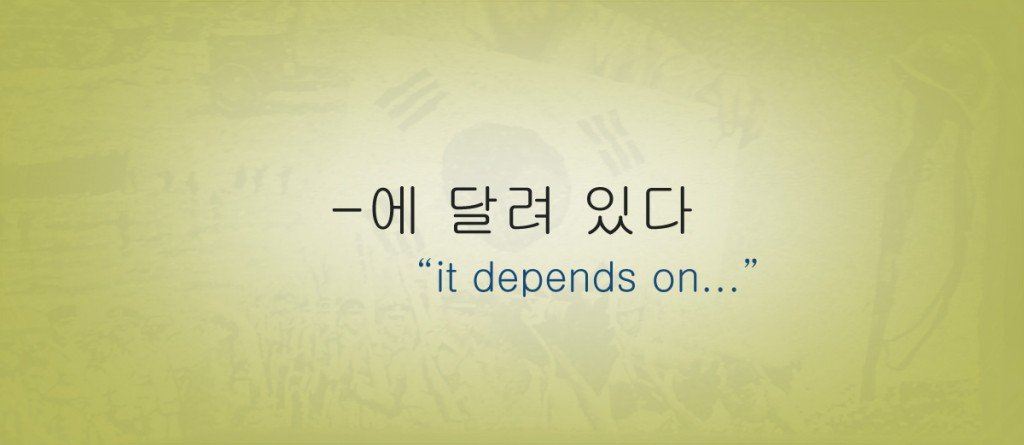-에 달려 있다 Grammar Lesson – “it depends on…”

-에 달려 있다 – “it depends on…”
There are various forms of this grammar pattern, but they are all used in the same way so it’s just a matter of how you want to say it. There are also ways to spice it up a notch which I’ll talk about later on in this article.
Usage
N -에 | (이)냐에 | 이었(느)냐에 (past)+ 달려 있다
Note: 에 becomes 에게 if it’s a person!
DVST – (으)냐에 | 었/았/였(느)냐에 (past)+ 달려있다
AVST – (느)냐에 | 기에 | 었/았/였(느)냐에 (past) + 달려있다
A Closer Look
This grammar, along with other similar ways of expressing the same thing, is an important one to know and to be able to use. In this particular grammar pattern, the second clause depends on the first clause and words such as “얼마나” and “어떻게” is often used in the first clause to form statements such as “it depends on how (much)…” like:
“...어떻게 하느냐에 달려 있다.”
= it depends on how you do it.
You’ll often encounter this pattern in the form of 생각하느냐에 달려 있다 (or even more commonly 생각하기에 달려 있다) which means “it depends on how you think about it“. If you want to say “success depends on how your determination,” you can say “성공은 마음먹기에 달려있다.” You can then replace 성공 (success) with pretty much anything achievable to make your own sentences.
Some more examples:
너에게 달려 있어.
= it’s up to you/it depends on you (notice how it’s 에게 and not 에!)
행복은 어떻게 살고 있느냐에 달려있습니다.
= happiness depends on how you live your life.
얼마나 예쁘냐에 달려 있어
= it depends on how pretty you are
Please note
To make an even more interesting sentence, you can add to the first clause “whether or not…” where you take the verb + 고 and its negative form +고는 (or 은/는 것은) (하고 안하고는…에 달려 있다 for example) .
You might also see -냐에 swapped out with -는가에 to form -는가에 달려 있다. Don’t be confused! It means the same thing. 그리고! Sometimes people like to add 따라 after 에 (…에 따라 달려있다). The meaning doesn’t change here either.
To sum it up – a very useful grammar pattern in all situations. It’s easy to use and makes you sound a little smarter if you use correctly. So if you run out of things to write about in your TOPIK essay, it’s really good to have in your arsenal of grammar.
For comparison, please check out our article on -기 나름이다.
By Kimchi Cloud





Thanks guys, I found this lesson very helpful.
im grateful to you it was really helpful